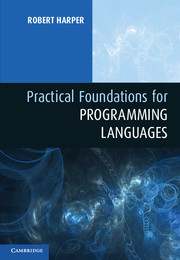Book contents
- Frontmatter
- Contents
- Preface
- Part I Judgments and Rules
- Part II Statics and Dynamics
- Part III Function Types
- Part IV Finite Data Types
- Part V Infinite Data Types
- Part VI Dynamic Types
- Part VII Variable Types
- Part VIII Subtyping
- Part IX Classes and Methods
- Part X Exceptions and Continuations
- Part XI Types and Propositions
- Part XII Symbols
- 32 Symbol
- 33 Fluid Binding
- 34 Dynamic Classification
- Part XIII State
- Part XIV Laziness
- Part XV Parallelism
- Part XVI Concurrency
- Part XVII Modularity
- Part XVIII Equational Reasoning
- Part XIX Appendix
- Bibliography
- Index
34 - Dynamic Classification
from Part XII - Symbols
Published online by Cambridge University Press: 05 February 2013
- Frontmatter
- Contents
- Preface
- Part I Judgments and Rules
- Part II Statics and Dynamics
- Part III Function Types
- Part IV Finite Data Types
- Part V Infinite Data Types
- Part VI Dynamic Types
- Part VII Variable Types
- Part VIII Subtyping
- Part IX Classes and Methods
- Part X Exceptions and Continuations
- Part XI Types and Propositions
- Part XII Symbols
- 32 Symbol
- 33 Fluid Binding
- 34 Dynamic Classification
- Part XIII State
- Part XIV Laziness
- Part XV Parallelism
- Part XVI Concurrency
- Part XVII Modularity
- Part XVIII Equational Reasoning
- Part XIX Appendix
- Bibliography
- Index
Summary
In Chapters 12 and 25 we investigated the use of sums for the classification of values of disparate type. Every value of a classified type is labeled with a symbol that determines the type of the instance data. A classified value is decomposed by pattern matching against a known class, which reveals the type of the instance data.
Under this representation the possible classes of an object are fully determined statically by its type. However, it is sometimes useful to allow the possible classes of data value to be determined dynamically. There are many uses for such a capability, some less apparent than others. The most obvious is simply extensibility, that we wish to introduce new classes of data during execution (and, presumably, define how methods act on values of those new classes).
A less obvious application exploits the fact that the new class is guaranteed to be distinct from any other class that has already been introduced. The class itself is a kind of “secret” that can be disclosed only if the computation that creates the class discloses its existence to another computation. In particular, the class is opaque to any computation to which this disclosure has not been explicitly made. This capability has a number of practical applications.
One application is to use dynamic classification as a “perfect encryption” mechanism that guarantees that a value cannot be determined without access to the appropriate “keys.”
- Type
- Chapter
- Information
- Practical Foundations for Programming Languages , pp. 276 - 282Publisher: Cambridge University PressPrint publication year: 2012

